Do you want to use the power of social proof to build your brand’s credibility? But what if you’re just starting out and don’t have a large following to rely on?
You’re not alone.
Many entrepreneurs face this problem at the beginning of their business, but not all of them find the right solution. Some try to shortcut the process by relying on fake social proof plugins.
Spoiler alert: don’t do that.
In this article, we’re going to give you 5 reasons to avoid fake social proof plugins. Plus, we’ll show you how to create a real following of loyal customers and grow your email list organically.
But first, let’s look at what we mean by “fake social proof,” and why some eCommerce business owners are tempted to buy their following.
What Is Fake Social Proof?
There’s an old saying you’ve likely heard a million times: “It takes money to make money.”
And it’s true, but not just for money. It’s the same thing with building a loyal base of customers. The more you have, the more you’re likely to gain.
Why? Because of social proof.
People trust brands that other people recommend (even if those other people are complete strangers). Unfortunately for new businesses, the reverse is also true.
Think about it.
Would you be more likely to buy a product from a vendor with thousands of reviews:

Or a similar product from a vendor with 10 reviews:

Chances are you’d go with the first one.
But how do smaller companies get the kind of social proof that will boost conversions when they are just starting out?
One strategy which some business owners have used is simply buying fake social proof or using fake social proof plugins.
When we say “fake social proof,” we don’t mean paying an influencer to advertise your product. We’re referring to a more sinister marketing plan:
Paying real money for a software or plugin that creates fake followers, likes, reviews, or testimonials to make your brand appear more credible to others.
Despite its ethical shortcomings, this is a surprisingly popular strategy.
NBC News even tested it out by creating a fake business on gardening:

Then they paid $168 to various companies for positive reviews. The result? Within a single day, the fake business had 999 likes. A few days after that, it had gotten more than 600 five-star reviews.
What’s also disappointing is that there are many “fake social proof plugins” which are easy to find. Here’s a description from one of those fake social proof WordPress plugins:

Another fake social proof plugin admits to creating false notifications right in their headline:

And while some of these plugins look a little sketchy from the outset, others seem completely professional. Take a look at this, another social proof software:
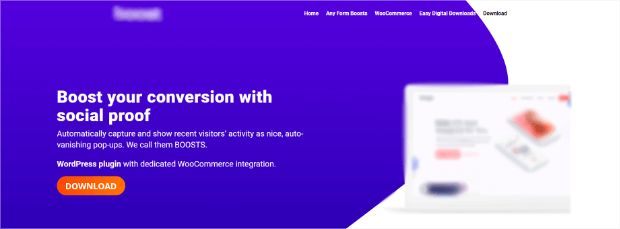
At first glance, this seems just as reliable as any other plugin. Then you get to their “Fake Boosts” feature:
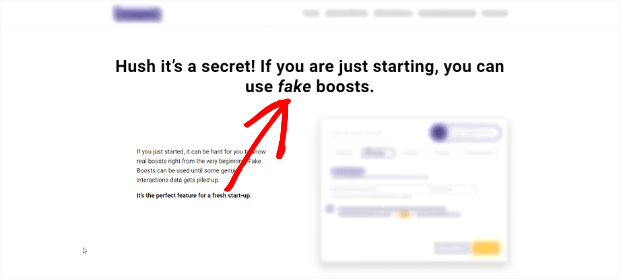
Ironically, customers are supposed to believe this company’s own social proof popups while literally reading a page on how to create fake social proof:

We don’t ever like to criticize our competition. What they (and their customers) decide to do is their own business.
But here at TrustPulse, we’re simply not into endorsing any blackhat marketing techniques.
In a minute, we’re going to look at a few reasons to avoid fake social proof plugins, but first, let’s see why so many business owners consider using them at all.
Why Would Business Owners Use Fake Social Proof Plugins?
For a lot of new business owners, the idea of buying fake social proof can seem harmless. After all, if a few fake reviews can get the right product into the right hands, what’s the problem?
Plus, the advantages of having social proof in your corner are difficult to ignore:
- 83% of people trust reviews over advertisements
- 56% of users suffer from FOMO (fear of missing out)
- Testimonials can increase conversion rates on sales pages by 94%
- Customers would spend 31% more on a business with good reviews
- 88% of buyers are influenced in their buying decision by reviews
With stats like those, it’s easy to see why someone would be tempted to buy their social proof when first starting out.
And let’s not forget the time it takes to actually create a loyal following. Trying to reach people organically has always been one of the biggest hurdles in marketing.
So buying social proof should, in theory, shortcut the entire process and grow your business at an exponentially faster pace, right?
Not so much.
The fact is that relying on fake social proof plugins or companies may seem like a good plan at first, but this practice can lead to some very harmful consequences for your business.
Let’s look at 5 reasons to avoid fake social proof if you want your business to succeed.
5 Reasons to Avoid Fake Social Proof (and Why TrustPulse Refuses to Offer It)
1. Your Real Audience Can Usually Spot Fake Reviews and Testimonials

Not all fake social signals come in the form of plugins. Some businesses hire people to write fake reviews for their products.
But if someone is really interested in your business, they’re likely to read your reviews more carefully.
In doing so, it’s not too difficult to find lazily written comments, noticing the same username appear over and over again, and even seeing celebrity headshots paired with ordinary usernames.
The bottom line is that there are tell-tale signs when reviews and testimonials aren’t genuine. The clients you actually want to acquire are the most likely to notice and, in the end, are the most likely to walk away from your offer.
And with new tools like ReviewMeta and Fake Follow Check, it’s becoming easier for customers to verify whether or not you’re relying on fake social proof.
Takeaway: Don’t underestimate your audience’s intelligence. They can usually spot a fake from a mile away.
2. The Risk Isn’t Worth the Reward
Social proof has been proven to boost conversions and sales. It’s just a fact.
But another fact is how hard it is to regain your company’s credibility once you’ve been caught lying.
Sunday Riley Modern Skincare, a cosmetics brand that sells through Sephora, made employees write fake reviews for its products between 2015 and 2017.
After getting caught, not only did they get a fine by the Federal Trade Commission (FTC), they faced a huge backlash from their real fans.
On Reddit, one poster nicely summed up the general feeling toward Sunday Riley after the scandal: “Joke’s on Sunday Riley, even if they actually have good products now I’ll never believe it because of their manipulation.”
As you can imagine, Sunday Riley is working hard to earn back their customer’s trust and having a difficult time doing so. Sales have suffered and other brands are wary of continuing partnerships with them.
Takeaway: Breaking trust is easy. Earning it back is infinitely tougher.
3. If You Cut Corners Here, You’re More Likely to Cut Them Elsewhere
The temptation to buy fake social proof comes from one of two sources: impatience or fear.
You either don’t want to take the time to build your audience organically, or you’re afraid that your product will never get the kind of loyal following you’d like to have.
Either way, both motivations are bad for building a business.
Multibillionaire Jon Hunstman outlines this concept in his book, Winners Never Cheat. He attributes his success to his integrity and character:
There are no moral shortcuts in the game of business or life. There are, basically, three kinds of people, the unsuccessful, the temporarily successful, and those who become and remain successful. The difference is character.
Buying social proof, rather than earning it, is indicative of how you’re running other areas of your business as well. While these practices may yield short-term results, they are likely to be the cause of your downfall in the long run.
Takeaway: When it comes to earning social proof, be patient and be confident. Your hard work and integrity will pay off.
4. It’s Flat Out Illegal

Not only is buying social proof a poor business strategy, but it’s also illegal.
The FTC makes this crystal clear and has the authority to penalize businesses “using unfair or deceptive acts or practices in or affecting commerce” (under 15 U.S. Code § 45). They outline this even more explicitly at the beginning of their Truth In Advertising page:
When consumers see or hear an advertisement, whether it’s on the Internet, radio or television, or anywhere else, federal law says that ad must be truthful, not misleading, and, when appropriate, backed by scientific evidence.
They’re also transparent about the consequences:
When the FTC finds a case of fraud perpetrated on consumers, the agency files actions in federal district court for immediate and permanent orders to stop scams; prevent fraudsters from perpetrating scams in the future; freeze their assets; and get compensation for victims.
Some major brands (like Sunday Riley) may be able to pay the fines and try to keep their hurting business alive.
For many small companies, however, getting caught for using fake reviews and testimonials results in the company going under.
Takeaway: If you don’t think ethics are a reason to avoid social proof, then consider the legal ramifications.
5. Fake Social Proof is Totally Unnecessary
This is by far the most obvious reason to avoid fake social proof plugins: you don’t need them!
If you’ve built a great product or brand, there’s nothing to worry about. With a little time and the right marketing strategy, you can get real reviews, real testimonials, and real fans of your business in no time.
Here are a few ways you can build real social proof instead of buying it:
Host a Contest
Contests and giveaways are a great lead generating tool, but they can also be perfect for getting your customers to review products. Run a contest that gives a prize to the customer who writes the most creative positive review of your product.
Or you can use a plugin like RafflePress to get broader forms of social proof.

Though RafflePress was designed for giveaways, it can also be used to create polls and surveys about how satisfied your customers were with your product.
Having statistics on your site like “93% of our customers LOVED their results” is a great way to use social proof to your advantage. RafflePress lets you easily (and quickly) get a hold of this type of data.
Automate Your Testimonial Collection Process
There are so many tools available now to generate leads for reviews and automate email flows.
With WPForms, you can create a form that is tailored for gathering reviews (and even include a 5-star ranking scale).
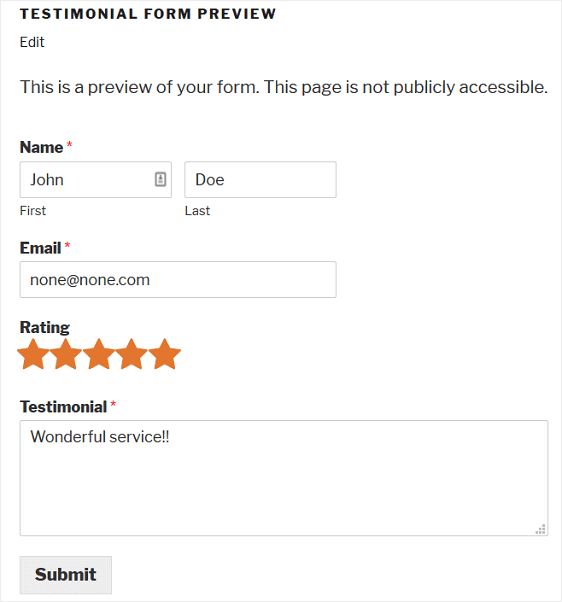
This form will have its own permalink so you can direct all your clients to a landing page. Once they’ve arrived, they’ll be able to rate your product and leave a comment if they choose.
But the big question still remains: how do you direct your clients to the landing page in the first place?
The best way is to rely on your email list. Once you have the permalink to your feedback form’s landing page, you can send out an email to your subscribers and include the link.
Since anyone on your list has already voluntarily given you their email address, you’re more likely to get a positive response from them.
If you want the best and easiest way to grow your email list, OptinMonster has got you covered.
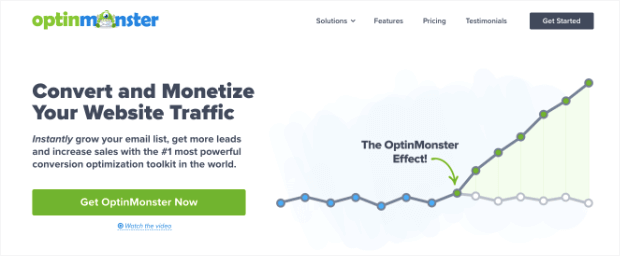
With OptinMonster, you can create a variety of campaigns that are proven to generate leads and boost conversions. It’s even been shown to drastically increase sales which, though it’s not the purpose of this post, is a wonderful byproduct. ?
Once you grow your email list with OptinMonster, you stay in control of the conversation. At any point, you can create an email campaign to invite your audience to fill out a feedback form.
By automating the way you gather social proof, you’ll be able to gather a larger amount of positive reviews and testimonials in a shorter amount of time.
Just don’t forget to make your forms mobile-friendly for your customers coming from smartphones!
Ask Nicely With a Truly Personal Email
People who have used and liked your product are usually more than happy to talk about it. Sometimes, they simply need a gentle reminder.
Send out a personalized email to your customers asking for a review or a testimonial about their experience with your product. But don’t automate this.
Select a few clients who love your product and send them a genuinely personalized email. If you can, try to include some detail that lets them know this isn’t another generic, templated message:
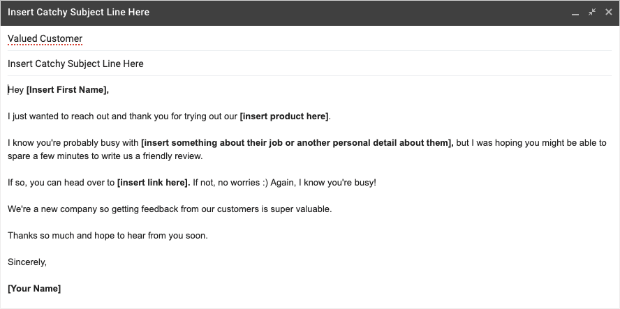
You likely won’t get a 100% response rate (ok… you definitely won’t), but there’s a good chance that you’ll have a few customers who are more than willing to share their glowing feedback.
Take to Social Media
More and more, we’re seeing reviews and testimonials in the form of posts on social media.
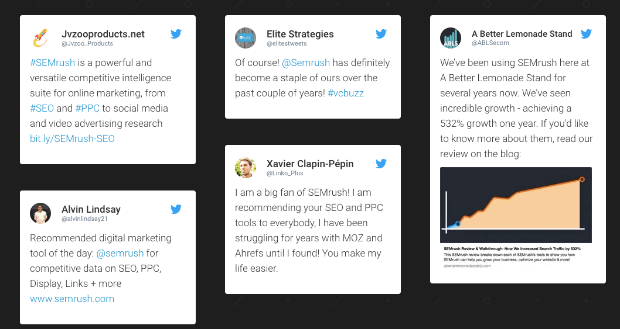
Head to your favorite social media platform and ask your audience what they thought about your product or offer. Again, your response rate might not be huge at first, but you should eventually have enough followers to get a few strong comments to use for your website.
Wouldn’t Buying Social Proof Just Be… Easier?
Yes. Buying social proof or buying fake followers for social proof would be easier than asking your customers for it and gathering feedback.
But easier doesn’t mean it will be better.
At the end of the day, there are many reasons to avoid fake social proof. But the main one is that it’s simply not fair to your potential customers. If you want to build a truly reliable following, you should only be attracting people who genuinely want and like your product.
You shouldn’t be focused on customers you’ve acquired through deceptive means.
That’s why we at TrustPulse don’t offer any fake social proof services. Beyond the fact that it can seriously harm your business (not to mention our own reputation), it’s a dishonest practice that, we believe, has no place on the market.
Our goal is to help people build their social following the honest way. And once that following is in place, we want to help you show it off! With TrustPulse, you can broadcast any verified action on your site so other visitors can see just how popular you are:

Why wait? Join TrustPulse today and start using social proof to increase your conversions and revenue.
